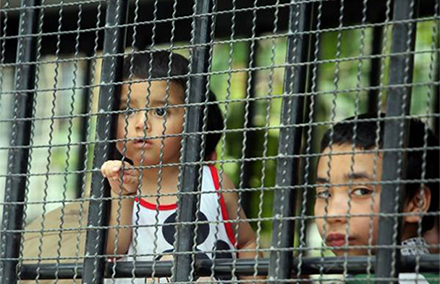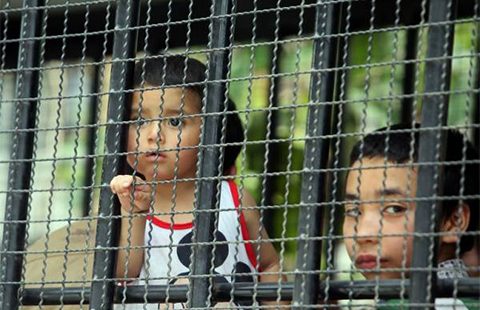
Thailand’s return of 109 Uighurs to China bodes ill for human rights and security in the region.
The Thai junta’s forcible return of 109 Uighurs to China on 8 July, was more than a horrific violation of international humanitarian law; it was another clear manifestation of the lengthening arm of Chinese law, the growing acquiescence of Southeast Asian governments to Beijing’s demands, and a further setback to Thailand’s return to democratic rule of law. Taken together, Thailand’s return of the Uighurs bodes ill for human rights and security in the region.
The Uighurs, have been systematically persecuted in China. Waves of Han Chinese migrants have made the Muslim Turkic peoples of Xinjiang province in western China, a minority in their own land. While there is an armed separatist movement, it is very small. Moreover, most Uighurs are moderate Sunnis and Suffi and there is very little evidence to support China’s claims that they are linked to global jihadist movements. Indeed China only provided scant evidence for 13 of the 109 linking them to violence or crime.
The government’s “Strike Hard” campaign, has led to an increase in terrorist attacks, while the conviction and life sentence of a moderate Uighur academic Ibrahim Tohti in September 2014, has precluded any sort of political compromise or accommodation. The government has tried to force people from outward manifestations of their faith, including preventing women from being veiled, men from growing beards, attending prayer services, and by banning fasting during Ramadan. During this year’s Ramadan holy month Chinese authorities held a beer festival in a city in Xinjiang.
In short, it would be hard to find a stronger case of government-caused insurrection than in China’s Xinjiang. China’s campaign against terrorism has become an all-out war on Islam. Concerns of cultural genocide are not an exaggeration. It’s no wonder people have fled persecution, en masse.
Thailand’s return of the 109 was a clear violation of the international legal principle of non-refoulement; there is little doubt that these people will be persecuted by Chinese authorities. The Junta’s claims that the return was both lawful and based on “humanitarian norms” is a clear indication of the Orwellian doublespeak that has become the norm of the junta, which claims to be a “99 percent democracy.”
China’s promise to protect the rights of the 109, was immediately belied as photographs of the group kept in black hoods to prevent “hijacking and hostage taking,” showed rights protection with Chinese “characteristics” at its worse.
Thailand was clearly afraid of running afoul of Beijing, one of its few friends since the military’s seizure of power in May 2014, in what was the nation’s second coup in eight years. In June 2015,Thailand allowed 173 Uighurs to be resettled in Turkey, angering China. Thai authorities have stated that they did not completely give in to Chinese demands, by not returning 60 additional people; though that may be only temporary as they have not yet made a determination of their nationality. Amidst an international backlash, on 11 July, Thailand sent eight Uighurs, four women and four children, to Turkey.
What does all this mean? First, China is increasingly committed to extending the reach of its security services overseas, in order to protect the communist regime’s interests at home. Increasing the reach of Chinese security services overseas is a key component of China’s new national security law that is both expansive and vague.
This was not the first time that Uighurs have been returned to China. In December 2009, Cambodia returned 20 to China. Hun Sen’s kleptocracy was rewarded with $1.2 billion in development assistance and loans. China later went on to build and fund Cambodia’s defense academy and remains its main supplier of arms and aid.
Indonesia allowed three personnel from China’s intelligence service, the Ministry of State Security, to attend the terrorism trial of four Uighurs arrested in Poso, who were allegedly trying to link up with the Mujihideen Indonesia Timur (MIT), the most lethal of all Jemaah Islamiyah’s splinter groups. Indonesian authorities have indicated that there is a preliminary agreement with Beijing that the four will be deported to China now that three have been convicted of terrorism.
Even Vietnam, which has had more than its share of disputes with China, has acceded to Beijing’s demands. In April 2014, Vietnamese border forces deported 21 Uighurs to China. In another incident, two Vietnamese border guards were killed in a shootout with a group of 16 Uighurs, killing five. The remaining 11 were deported. In January 2015, Chinese authorities killed two Uighurs, and arrested 43, including 19 children, on the border with Vietnam.
In 2012 Chinese authorities staged a joint operation with Lao police to capture a drug trafficker who was responsible for the October 2011 murder of 13 Chinese sailors on the Mekong. At the time, the Chinese government indicated that it had considered targeting the trafficker with an armed drone.
Second, we are seeing governments across Southeast Asia increasingly acquiesce to Chinese demands. The Thai case is a clear diplomatic victory for Beijing. Returning Uighurs and dissidents is an easy, low-cost way to curry favor with Beijing. Junta leader General Prayuth Chan-ocha’s comments that “They will be provided with justice and safety” and assertions that Chinese assurances that the Uighurs “will be given access to fair justice,” is blissfully naive and dismissive; one dictator talking to another.
And it comports well with the authoritarian world views of the governments in the authoritarian regimes of Vietnam, Laos, Cambodia and Thailand, whose governments are obsessed with internal security, equating regime survival with national survival. These governments may not like China’s strong-arm tactics in the South China Sea or in regional diplomacy, but they appreciate repression for the sake of maintaining a monopoly on power.
Moreover, China’s demands create a dangerous precedent in the region to return dissidents who have well founded fears of persecution. Cambodia has complied with Vietnam’s demand to return 16 Montagnards. Vietnam successfully lobbied the Thai junta to cancel Human Rights Watch’s rollout of their recent report on the Montagnards at the Foreign Correspondent’s Club in Bangkok. The Thai junta has tried, though largely failed, to pressure neighboring states to render fugitive Red Shirts.
Third, one cannot separate the Thai junta’s decision to purchase the three Yuan Class submarines for the friendship price of $1.1 billion from the return of the Uighurs. Yes, the sale was in part to further weaken Thailand’s alliance with the United States, and is now temporarily on hold. But as China has demonstrated with Laos and Cambodia, there are very real quid pro quos for Chinese aid, despite Beijing’s oft stated comment that in contrast to the West, Chinese assistance is without conditions. There are plenty of conditions and with dire consequences to real people with palpable fears of persecution.
Fourth, this is an enormous blow to Thailand’s international reputation and its tone deaf leaders appear unfazed by the opprobrium from Western governments and human rights organisations.
Have Thai diplomats lost what little sway they might have had over the self-serving junta? Does the junta really not care how far Thailand has fallen?
But more to the point, it is a further setback for the return to democracy and the rule of law.
Once a leader of ASEAN, Thailand is now an increasingly irrelevant dictatorship. And a dictatorship with a faltering economy, whose military and royalist elites have sown the seeds of years of future political conflict with their refusal to engage in national reconciliation and push for a charter that systematically disenfranchises the electorate, while empowering unelected bodies.
Zachary Abuza is a principal at Southeast Asia Analysis specialising in regional politics and security issues. He has authored numerous books including Conspiracy of Silence: The Insurgency in Southern Thailand (2008) and Militant Islam in Southeast Asia (2003).
 Facebook
Facebook  Twitter
Twitter  Soundcloud
Soundcloud  Youtube
Youtube  Rss
Rss 